Mary Kingswood's Blog, page 17
January 12, 2023
Review: The Tenant of Chesdene Manor by Alice Chetwynd Ley (1974)
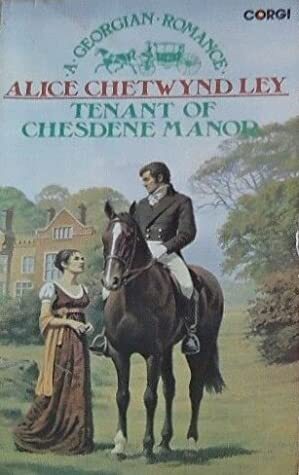 I loved this book. Yes, it’s old fashioned and short and ends abruptly, but none of that is a problem for me. I loved both the main characters, the villainy was unexpectedly believable and the plot just rolled along seamlessly, without a single jarring moment. I’m on something of a binge-read with this author. She’s no longer around so the catalogue is limited, but I’m delighted that her family is making them available again for those of us who appreciate the traditional Regency style.
I loved this book. Yes, it’s old fashioned and short and ends abruptly, but none of that is a problem for me. I loved both the main characters, the villainy was unexpectedly believable and the plot just rolled along seamlessly, without a single jarring moment. I’m on something of a binge-read with this author. She’s no longer around so the catalogue is limited, but I’m delighted that her family is making them available again for those of us who appreciate the traditional Regency style.
Here’s the premise: Diana Chalfont and her mother have been left almost destitute after Diana’s father, Sir Peter Chalfont, gambled away most of his fortune. Only the estate remains, and the dilapidated manor house, Chesdene Manor. The ladies live in the more modern wing, still reasonably habitable, while the main part of the house slowly decays. The new owner, Sir Sidney Chalfont, is a distant cousin, since the only other male heir, Robert, was drowned on a voyage to India many years ago. He’s a gambler, too, and has no interest in the estate, allowing the ladies to stay on there, and even giving permission for them to find a tenant for the dilapidated part of the building.
Astonishingly, one day a stranger turns up wanting to rent it, and even sets about repairing it. Christopher Richmond is an odd, uncommunicative man, but Diana’s not inclined to turn away anyone who’ll pay rent. He goes up to London while the repairs are under way, and by the sort of strange coincidence with which Regencies are littered, Diana is also going there with a friend, and there is much riding in Hyde Park, a ball or two, and an outing to Richmond. No, this book is not exactly treading new ground, but it’s none the worse for that.
There really isn’t much more to say about this. The mystery of Mr Richmond was blindingly obvious from about page 3, Sir Sidney’s activities were easily understood, and there were two side romances which were uncomplicated and (frankly) rather forgettable. I was a bit puzzled by why there was no mention of the income from the Chesdene estate – there should have been tenant farmers and the like providing some income for Sir Sidney. I also wasn’t sure why he was awarded his baronetcy when there was still a remote possibility an heir with a better claim might yet turn up. The powers that be in these cases generally wait a long time before they pass over ‘missing’ heirs. He might have gained control of the estate, but certainly not the title. But it’s a trivial point.
I have to say that part of the reason I enjoyed this book so much is because of the two main characters. Mr Richmond is the strong, silent type, who’s also extremely competent in business, and even a little domineering (which was the norm for books of this age). He also has a rather quirky sense of humour, which I loved. I think he was meant to be slightly spooky in a sort of Gothic way, but Diana doesn’t see him that way, and neither did I. As for Diana, she works rather well for modern audiences, I think. She’s feisty and independent-minded, good at everything and kind to everyone – that makes her sound like a bit of a Mary Sue, but she has a lot of self-deprecating charm. As for Sir Sidney – yes, he’s a bit of a buffoon, but he’s foolish rather than wicked, and I like to think that he’ll reform and live a blameless life henceforth.
This is a short and sweet read, clearly influenced by Georgette Heyer but none the worse for that. A lovely, easy read with a pleasant hero and heroine. I’d have liked a bit more emphasis on the romance, but it’s typical of the era, so I won’t criticise it for that. Five stars.
Review: The Jewelled Snuff Box by Alice Chetwynd Ley (1959)
 This book was first published in 1959, more than sixty years ago – a very different era. It’s wordy in places, there’s a fair amount of head-hopping (jumping from one character’s internal thoughts to another’s without a signal) and the plot veers between implausible and outright incredible, and yet I found it a whole heap of fun. I liked the two main characters, the difficulties between them were believable and the romance was low-key but rather sweet. For modern readers, it might be jarring but for anyone weaned on Georgette Heyer, this is a nice, light read.
This book was first published in 1959, more than sixty years ago – a very different era. It’s wordy in places, there’s a fair amount of head-hopping (jumping from one character’s internal thoughts to another’s without a signal) and the plot veers between implausible and outright incredible, and yet I found it a whole heap of fun. I liked the two main characters, the difficulties between them were believable and the romance was low-key but rather sweet. For modern readers, it might be jarring but for anyone weaned on Georgette Heyer, this is a nice, light read.Here’s the premise: Jane Spencer is travelling to London to take up a position as a companion after several years as a governess. Her stage coach is caught in snow, and the passengers are forced to walk up a hill to spare the horses. During the walk, Jane finds a man lying unconscious in a ditch, possibly set upon by highwaymen. Under his inert body, she finds a treasure the thieves missed – a valuable jewelled snuff box. The stage coach passengers and the injured man are forced to take shelter overnight at a small wayside inn, where Jane discovers that the man has lost his memory.
She looks after him, and they strike up an instant rapport. She rather fancies him, and he trusts her, so when the stagecoach sets off again, she takes him with her to London to meet her lawyer, who she hopes will help him find out who he is. But when she’s concluded her own business with the lawyer and goes to bring in the mysterious stranger, he’s disappeared. Jane’s very disappointed, and a closer look at the snuff box reveals a secret – a hidden letter, making an illicit assignation with a married woman. Now she’s seriously disappointed, and tries to set him out of her mind.
But there’s another shock when she takes up her new position – Celia, the countess she’s to work for, is a girl she knew at school as a bully and a thoroughly unpleasant person. She’s delighted to have the chance to make Jane’s life miserable all over again, and to make matters worse, her husband takes a creepily strong interest in Jane. And when Jane finally discovers the identity of her mystery man, not only has he forgotten her, but it’s Celia he’s been having an affair with…
Now, this is a fairly tangled situation, and it’s a short book, so not everything is resolved satisfactorily, to my mind. In particular, I’d like to know just how Celia’s comeuppance worked, legally. I don’t want to give too much away, but she was just air-brushed away in a page or two, and I’d have liked to know a bit more about it. I also wondered very much just why the earl married her, because he seemed like a sensible guy, much older than her and too smart and experienced to be taken in by Celia’s sickly-sweet public face. I just didn’t believe that he could be so much in love with her that he didn’t see what she was really like.
As I said at the beginning, there’s a lot of implausibility in the plot, particularly in the amnesia business. It’s a very common trope in the genre, and one I try to avoid as much as possible. I see the appeal in it, because what could be more delicious than a character who doesn’t know who he is? So much mystery to unravel, and so much tension – is he rich or poor, a grocer or a marquess? Although in this case, there’s an early discussion of our hero’s expensive clothes and shiny boots, so it’s obvious he’s a gentleman of means, at the very least. But it’s still hard to suspend disbelief. A simple bump on the head, everything’s forgotten, but later the memories will all come back and there’ll be no lasting ill effects. Nope, not believable. But I like to give a book it’s basic premise, however hard to swallow, so I went along with it, and then became thoroughly caught up in the plot.
The story is a bit uneven, and it became hard to remember sometimes just who knew what (or rather, who DIDN’T know what), but there’s one glorious scene in the middle between the earl, Celia, Jane, the hero and Celia’s maid, where everybody knows things are not what they seem, even though nobody quite knows everything, but they all just play along with the hastily improvising Celia as she tries to get them out of a huge mess. It could have been a deeply emotional moment, but the author basically plays it for laughs and it turns into the best part of the book.
As usual with Regencies of this era, the writing is literate and historically accurate, influenced very much by Georgette Heyer (although I rolled my eyes at every ‘pon rep!’). It’s not perfect, and it does require a shed-load of suspension of disbelief, and the ending is extremely abrupt (if you’re a fan of long, syrupy epilogues, this is not the book for you), but I really enjoyed it, quirks and all. Those implausibilities keep it to four stars.
December 16, 2022
A Fickle Fortune by Christina Dudley (2022)
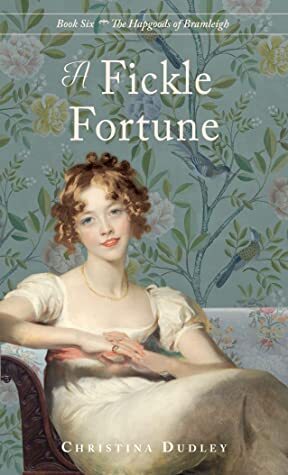 After the slightly flat story of Edith and Lionel in A Purloined Portrait, this is an absolute cracker. Hetty in London is a delight. As is inevitable with any Regency novel set during the London season, there are well-worn paths to tread and over-used tropes to drive the plot, but Hetty and her swain are so gloriously different, and the background characters so fascinating, that it’s easy to overlook.
After the slightly flat story of Edith and Lionel in A Purloined Portrait, this is an absolute cracker. Hetty in London is a delight. As is inevitable with any Regency novel set during the London season, there are well-worn paths to tread and over-used tropes to drive the plot, but Hetty and her swain are so gloriously different, and the background characters so fascinating, that it’s easy to overlook.
Here’s the premise: in the last book, Hetty’s machinations secured the engagement of her cousin and brother, but left another cousin, Caroline, without a betrothal. Caroline is to have a season in London, and when Hetty is invited to join her, she sees a way to repay Caroline for her previous bad turn and help her to find a husband. Caroline sets her sights on the season’s glittering prize, Mr St John Rotherwood, newly wealthy and formerly a tutor of Hetty’s brother Lionel at Oxford. Hetty has an instant advantage over every other young lady – she knows the prize already, so she determines to use her advantage to Caroline’s benefit. But Mr Rotherwood is a scientist and intellectual, and Caroline is (frankly) an air-head. Instead, it’s curious, avid reader Hetty who has most to say to Mr Rotherwood.
This doesn’t suit Caroline, but it also doesn’t suit Mr Rotherwood’s mother, Anne, who suffered for years as the outcast of the family for marrying beneath her, and is now determined to resume her place in society and see her son marry as befits his new position. You’d imagine she would be sympathetic to her son’s growing love for Hetty and want him to choose with his heart, as she did, but no. All the resentments of the years, and her pride in being a baronet’s daughter, combine to make her ambitious for her son. A duke’s daughter is perhaps beyond his grasp, but there’s the very beautiful, if vapid, Lady Sylvia, an earl’s daughter…
Poor Mr Rotherwood is caught in the middle of these machinations. He hates the emptiness of the social whirl, and would far rather get to know the intriguing Miss Hetty Hapgood, who at least has a brain in her head, but he also wants to make his mother proud of him. It’s a dilemma. And just at this point, a huge scandal erupts around Hetty, and Mr Rotherwood steps forward to save her from condemnation. And so we get into the very traditional trope of the enforced betrothal, which the two protagonists arrange between themselves rather ingeniously.
This might have been a predictable tale, but Dudley eschews the well-worn paths of innumerable other authors, and imbues her characters with creative minds and real emotions. Hetty, in particular, is a wonderful character, always brimming with original ways to solve problems, her own or other people’s, and I was thrilled to bits when she finally snatched her own happy ending from seeming defeat. Mr Rotherwood makes a terrific hero, too, and even his mother, who seemed to be an obstacle for most of the book, softened considerably in the end.
I am so sorry to reach the end of this glorious series, although happily the author is already writing a new series, with another delightfully quirky family to enjoy. Christina Dudley is one of my absolute favourite authors, without a single dud in her catalogue. This one is another five star read for me, but I commend every one of her books to anyone who wants an original, literate and downright charming Regency.
The Purloined Portrait by Christina Dudley (2022)
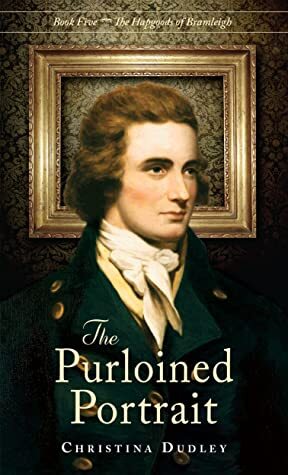 Well, here’s a thing – a Christina Dudley book that didn’t set me on fire. Was it well written? Yes, of course. Did I enjoy the read? Yes, absolutely. But I felt a little like Hetty, who writes impatiently of Edith’s letters that they were 3/4 art and only 1/4 interesting stuff.
Well, here’s a thing – a Christina Dudley book that didn’t set me on fire. Was it well written? Yes, of course. Did I enjoy the read? Yes, absolutely. But I felt a little like Hetty, who writes impatiently of Edith’s letters that they were 3/4 art and only 1/4 interesting stuff.
Here’s the premise: Lionel Hapgood has loved his cousin Edith from the moment he set eyes on her, and he’s waited for years for them both to grow up so that he can marry her. But when he finally can’t wait any longer and blurts out his feelings for her, he takes her by surprise. She’s devoted so much thought and energy to her art, that she’s never given a thought to her own feelings, or even begun to think about marriage. She rebuffs him, leaving him in despair. But when she falls victim to an unscrupulous artist, the two are thrown together again in the most dramatic fashion.
This is book 5 of the series, and the pacing is very different form the others. For one thing, it unwinds back to the earliest days of Lionel’s dealings with Edith and her burgeoning artistic talent, so apart from an opening chapter to set up the later story, the pace is slow and the style is more narrative than action. Of course, it’s written with Dudley’s characteristic flair, but I missed the humour of the earlier books and the development of the story felt rather flat. There was a vast amount about Edith’s art, and I felt I could easily have dispensed with quite large chunks of that. It’s not until we get to Lionel’s first, botched, proposal that the pace picks up a little, and towards the end the action becomes almost too breathlessly fast.
Lionel and Edith are both lovely, sweet characters, and all their actions are completely understandable. Edith’s absorption in her art is very believable. Lionel’s devotion to her from such a young age (he was maybe thirteen when they first met?) seems to stretch credibility slightly, but I can easily go along with that. And then we have the vast array of the extended Hapgood family in the background. I don’t recommend reading this as a stand-alone book – it works much better if the whole series is read in sequence.
Now, to the villain(s) of the piece, and this is where things get a bit spoilerish, so skip to the last paragraph if you don’t want to know more. When Edith’s paintings are stolen, it doesn’t seem to have occurred to anyone that the villain might be responsible for staging the whole thing. Yet when Edith gets to London and hears that her own painting has been exhibited at the Royal Academy, she immediately assumes that the artist submitting it is the villain. Yet it would have been more logical to assume it’s the (supposed) unknown thief. It would have been more realistic (and dramatic!) for her not to guess he’s known to her until she is brought face to face with him again. And since he clearly stole (or copied) her painting and then falsely submitted it to the RA, surely there would have been legal pressure that could have been brought to bear against him? I found it incredibly frustrating that nothing terrible ever happened to him. And even more so that the painting itself was never recovered. I know that’s more realistic, but as a reader it felt like a very unsatisfactory outcome. It would have been nice to have some acknowledgement of it, perhaps for Edith to say that she doesn’t need the painting any more because she has the real thing instead.
But the romance is glorious, I loved the ingenious Hetty’s efforts to help and although I would have preferred the two to marry at once, I can (again) recognise that the way events actually played out was more realistic. This was a slightly frustrating read for me, but even a slightly flat Dudley book, with too much art and not enough actual romance, is way, way better than 99% of everything else on the market at the moment. Four stars and on to the irrepressible Hetty and the final book of the series.
November 3, 2022
Review: Scandal’s Promise by Pamela Gibson (2020)
 This was a book that had so much potential. It could have been full of five-star-awesomeness, but instead a whole heap of little things kept tripping my fuses, which dragged it down a bit. That’s not to say that I didn’t enjoy it, because I did, but I was sad that it didn’t quite reach the heights it could have done.
This was a book that had so much potential. It could have been full of five-star-awesomeness, but instead a whole heap of little things kept tripping my fuses, which dragged it down a bit. That’s not to say that I didn’t enjoy it, because I did, but I was sad that it didn’t quite reach the heights it could have done.Here’s the premise: Andrew Quimby, newly inheriting the title of Earl of Cardmore, returns to his ancestral seat to find it more or less abandoned, the rooms shut up and most of the servants gone. Andrew isn’t in a much better state himself. Seven years fighting the Napoleonic Wars have left him with an injury that seems to be healed, so why does he suffer from recurring pain? Only laudanum (opium) makes it better, topped up with alcohol.
Lady Emily Sinclair lives next door and seven years ago she was betrothed to Andrew when he inexplicably married another woman. She died in childbirth within the year, but Andrew stayed away from Emily, and she’s not sure she can forgive him for his betrayal. She’s never married, and suspects she never will now, but she’s quite content as a spinster, and is determined to stay away from him… isn’t she?
So we have a second chance romance, and the problem here is the usual one – however plausible the failure on the first go round, there isn’t any real obstacle to a speedy resolution this time. She’s a spinster, he’s a widower, they still love each other, what’s to keep them apart? If the hero had an ounce of common sense, he would go straight to the heroine, explain what happened the first time, tell her he still loves her, and set about courting her with determination. Well, that would be logical, but it wouldn’t make for much of a story, so the author resorts to all sorts of devious schemes to keep the two apart – misunderstandings, miscommunication, mishap, machinations by others and so on.
It has to be said that most of the trouble is my least favourite trope, the misunderstanding. Andrew never properly explains himself to Emily, never shows her that he loves her, never really talks to her, so she finds things out piecemeal and gets hold of the wrong end of the stick entirely several times (understandably, actually). The result is that she is repeatedly dithering between wanting him and deciding she’ll never be able to trust him again. And Andrew, for his part, swivels about between hope and despair, deciding one minute that he’ll win Emily back no matter what and the next that he’s lost her for ever. Inevitably, this is a high-angst book, and it got a tiny bit old towards the end.
I liked both the main characters. Andrew was a deeply flawed character who needed a big redemptive arc, and it took him a long time to get there, but he’d had a rough childhood, so I could give him some leeway. And Emily was a strong character, who may have had passionate feelings but was also well able to keep them under control, like a good Regency lady – most of the time, anyway! I liked Aunt Lily, and would have liked more of her, and Andrew’s friend Ralston had the thankless task, so common in Regencies, of playing a minor role while being a far more worthy character than the hero. Be warned that this is book 3 of a series, and there were characters popping up from earlier books, which is lovely for those who’ve read them, but a bit disconcerting for those who haven’t, although they are explained quite well. Still, it felt a bit as if something was missing.
One of the high points of the book is the way it deals with Andrew’s opium addiction. This must have been a common problem in the era, because laudanum was the only really effective pain relief known, and readily available, but it was highly addictive (and still is, of course). The periods of euphoria interspersed with dark despair, and the steady spiral downwards were brilliantly portrayed. We also saw something of Andrew’s recovery period (although mercifully not much). I wasn’t completely convinced by his relatively rapid return to normality. I don’t know whether that’s accurate, or creative licence to fit the time scale of the book.
What worked less well for me? The drama seemed a bit over the top, and the villain of the piece seemed to come almost out of the blue. There were some clues, and to be honest there weren’t many possible suspects, but at the end it almost seemed as if they compiled a list of suspects and said, well, it must be him. And it was. But maybe I missed some hints, who knows.
One other problem for me (which may not affect other readers) is the relaxed attitude to historical accuracy. This just didn’t feel like an authentic Regency, to me. The book uses a multitude of American expressions, as well as some phrases that were far too modern (the heroine wants closure, for instance). I found these a repeated irritation, but that’s just me; it’s a stylistic choice by the author. One thing she got absolutely right, though, is the legal question of the child, so kudos for that. Also, there’s a fair amount of sex in the book – one actual sex scene and a number of lustful moments, which get anatomical, so if you’re looking for a clean read, best to avoid this one. I don’t mind sex in my Regency reads, but the hero and heroine were a little too ready to fall into passionate embraces (and then immediately decide they shouldn’t do that again). The Regency is all about restraint, after all.
This is a solid read with an interesting plot that I enjoyed a lot, but for me it was let down by the back-and-forth angsting of hero and heroine, too much lusting and all those Americanisms and modern expressions. Four stars.
October 20, 2022
Review: The Curlew’s Call by Jayne Davis (2022)
 I’ve been waiting for this to come out because the premise is so intriguing. And even though I knew how it would have to end, the interesting question was how the author would get to that point and make all the characters sympathetic. Be warned, however, that there is one scene of a sexual nature, and the book contains some serious sexual themes, dealt with in a sympathetic but honest way.
I’ve been waiting for this to come out because the premise is so intriguing. And even though I knew how it would have to end, the interesting question was how the author would get to that point and make all the characters sympathetic. Be warned, however, that there is one scene of a sexual nature, and the book contains some serious sexual themes, dealt with in a sympathetic but honest way.Here’s the premise: Ellie Wilson has been married for five years without a hint of a child. But on her way home after a family funeral, a coach accident throws her into a chance meeting with Captain Tom Allerby, who happens to be passing and stops to help as the stranded passengers, some injured, struggle to a nearby inn. An initial spark of shared trouble and friendship deepens over the evening to something more, and the two share one night of passion before separating, not expecting to meet again. But Tom can’t forget the woman he knew so briefly, and Ellie finds herself with a permanent reminder, in the form of a child. And since her husband is more friend than lover, he’ll know it’s not his.
Normally I’d describe something of how the protagonists resolve their problems, but I don’t want to do that here. Suffice to say that there are multiple challenges for our hero and heroine to deal with. Ellie has to own up to what she’s done and her husband has to decide how to cope with the revelation. Martin has problems of his own, too, including a cousin who’s trying to wrest control of his two farms from him. And Tom returns after two years to find Ellie, and is faced with a situation he hadn’t expected. It will not surprise anyone to hear that there is a happy ending to all this trouble, but things get very dramatic along the way.
Davis is a writer whose evocation of the Regency era always feels spot on to me, and this book is particularly enjoyable because it’s far away from the usual themes of balls and Almack’s and rides in the park. These pages are populated by hard-working ordinary folk – doctors and farmers and horse-breeders and attorneys and their women. Their marriages are as likely to be pragmatic as romantic, the misfits are fitted in somewhere, people are accepted for who and what they are, in the main (Ellie’s pious and selfish father excepted). And there are good and bad everywhere. It all feels very real, and there are little vignettes that don’t impact the plot greatly but provide those little flourishes that provide colour and depth (I’m thinking particularly of Kate and Tom’s brother’s wife and the poor, long-suffering magistrate).
If I have a complaint at all, and it’s a very minor and personal one, I’d have liked a bit more passion from Ellie and Tom towards the end. Given that the story kicked off with a night of illicit passion, I thought they were a tad too restrained afterwards. There were some highly emotional moments of terrible fear when the subsequent relief might have swept them into some fervent kissing, at the least. But it didn’t happen and that’s OK too. The author knows her characters best, and perhaps the memory of the time when they didn’t restrain themselves kept them in line later. There, that explains it nicely.
A wonderful, satisfying story, with bittersweet moments but a lot of joy, too. A great read. Five stars.
Review: Derriford by Jenny Hambly (2022)
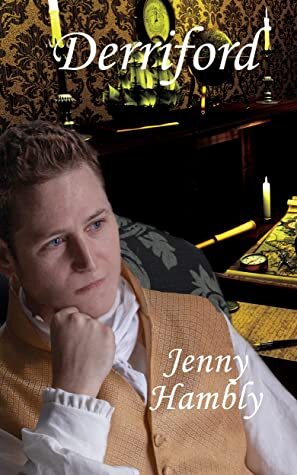 A new Jenny Hambly book is always a treat and this one is no exception. A lady-averse hero, a spinster resigned to her unwedded state and some intriguing mysteries to solve – what’s not to like?
A new Jenny Hambly book is always a treat and this one is no exception. A lady-averse hero, a spinster resigned to her unwedded state and some intriguing mysteries to solve – what’s not to like?
Here’s the premise: Miss Mary Coker is thirty years old, and even her father thinks (and says!) that she’s past her last prayers, as far as getting a husband is concerned. She’s outshone by her beautiful younger sister, and her father is too tight-fisted to pay for her to have a proper season. She’s not downhearted, however, and when a new neighbour, Lord Derriford, moves into the long neglected house next door, she’s quite happy to help him refurbish it without having any designs on him. For his part, the viscount is more than happy to have the refurbishment done as swiftly as possible. He’s been left the house on condition that he lives in it while it’s renovated, and – the part he dreads – that he accepts every invitation offered while he’s there. Derry’s difficulty is that he’s only comfortable in male company, and becomes bumblingly tongue-tied with females. But Mary is a composed and understanding girl who immediately sets him at his ease, and Derry begins to realise that not all females are terrifying creatures who reduce him to jelly.
If this were all, the book would barely make a novella, but happily there is a large cast of side characters, some of whom have their own romantic entanglements going on, and there’s also a mystery to be resolved and a couple of villains, which give Derry (and his lady!) the chance to shine. I confess to becoming a little fogged with the multitude of characters and the details of the family history that formed the backdrop to the mystery, but I eventually sorted out the characters and just went with the flow for the mystery, which worked fine.
I have to say that I absolutely adored Derry. He’s such a lovely character, who comes across as a bit of an idiot in mixed company when the presence of ladies ties his tongue in knots, but he’s brilliantly adept in other ways, a really complex character. In some ways he reminded me of Heyer’s Freddy Standen, from Cotillion, but it’s more the odd turn of phrase and the way he says ‘dashed’ a lot, rather than his actual character. Mary is lovely, too, so practical and accepting of life, and yet resourceful, too. I can’t imagine what her family will do when she marries, because she’s absolutely the mainstay of the household.
Some highlights: Mary sewing stars into the cushions, Derry hanging on to the wilting flowers, Derry and the wasp, Sir Reginald showing his true feelings, Lord Winterbourne (who is a bit of a buffoon early on) stepping up to become a hero when he needed to. Lovely moments, and of course the final proposal scene which turned out to be funny and tender and so, so satisfying all at the same time.
Another wonderful read from Jenny Hambly, beautifully written, with fully realised and believable characters and an authentic evocation of the Regency. Five stars.
Review: A Fall From Grace by Jennie Goutet (2020)
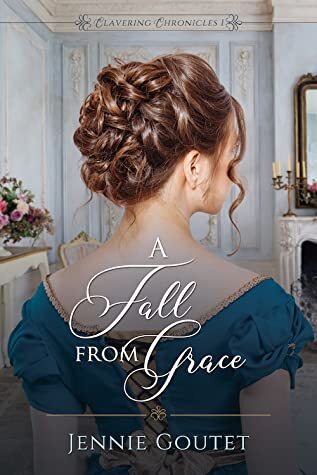 A charming tale, with nothing terribly original about it but none the worse for that. Sometimes a well-written traditional read is exactly what’s wanted.
A charming tale, with nothing terribly original about it but none the worse for that. Sometimes a well-written traditional read is exactly what’s wanted.Here’s the premise: Selena Lockhart’s family is the one who’s suffered the fall from grace of the title, her father having gambled away his fortune and then drunk himself into an early grave. His widow and daughters are reduced to poverty, Selena’s betrothed breaks off their engagement and Selena is obliged to accept a position as companion to a distant relation, Lady Harrowden.
The stage coach breaks down in the snow and she seeks shelter from a nearby hunting box. The tale is channelling Heyer’s Arabella at this point, and to similar effect, for the occupant is Sir Lucius Clavering, a baronet who has retreated from a surfeit of demanding relations and the attentions of matchmaking mamas. He naturally assumes she’s attempting to force a proposal by scandal, not least because he already has one young lady under his roof trying it on. He quickly realises that Selena is genuinely a damsel in distress, and is able to use her to protect himself from the avaricious Miss Woodsley. He takes Selena to her destination.
Here she finds that the widowed Lady Harrowden is precisely the sort of irrational, authoritarian, demanding elderly woman so beloved of Regency romances, and so useful for plot contrivances. In addition, the new Lord Harrowden is another staple of the genre, the rakish but handsome young man who immediately identifies Selena as the sort of destitute but beautiful female who can be seduced into becoming his mistress. He takes her for a long walk in the snow, where she is rescued (again) by Lucius (why on earth did she go with him? I don’t for one minute believe that she couldn’t say no). And the ambitious hussy, Miss Rebecca Woodsley, turns out by a tremendous coincidence to be Lady Harrowden’s ward who has run away from school, and is now added to the long list of Selena’s responsibilities. I wasn’t at all clear how Rebecca came to be Lady H’s ward, or what Lady H meant by not having the blood to marry well, despite a tidy fortune (I wondered if she were illegitimate? Descended from trade? Not clear, although I read this so quickly I may have missed it).
Selena’s arrival prompts the negligent Sir Lucius to fulfil a promise to the late Lord Harrowden to look after his widow, which Lucius now attempts to rectify. And if that throws him into the path of the intriguing Selena, he has no objection to that. Since she likes him too, it seems that the romance is set fair for a swift conclusion. There are no obstacles, after all – or are there?
This is where things go awry, because Selena’s past rises up to disturb the present. Lucius’s sister Maria tries to steer him away from the ladylike Selena (why?) and towards the pretty but feckless heiress Rebecca Woodsley (again, why?) by deliberately inviting Selena’s former betrothed to a ball to make a scene. Which he does, in spectacular fashion, so that Selena is ostracised all over again.
And here is where Lucius fails the hero test, because instead of rescuing her from this humiliation, he stands aside. The stated reason is that he doesn’t want to make what amounts to a declaration by springing to Selena’s defence. But he could spring to his sister’s defence – the man is making a scene at Maria’s ball, and Lucius would be quite within a brother’s rights to step in. So I disagreed very much with his logic here.
And even when he’s made up his mind what he wants to do, he leaves Selena dangling instead of being open with her, and she, silly girl, decides she’s not worthy of him. So it all gets a bit muddled and although it comes right in the end, I wasn’t mad keen on Lucius’s solution to the problem, which is all a bit domineering.
The writing is excellent, but I had some minor quibbles, mostly trivial Americanisms that wouldn’t worry most readers but repeatedly tripped me up – things like ‘go do something’ instead of ‘go and do’, ‘look out the window’ instead of ‘look out of the window’ and one solitary gotten. I told you they were trivial. On the special licence front, I’m not at all sure that it would work that way, but nobody seems to get that right (even Heyer got it wrong) so let it pass. I would have liked more interaction between the principals to show the deepening of their relationship, but there’s a glorious interchange near the end when he’s trying to persuade her to marry him which I adored. I’d have liked a lot more like that to show the connection between them.
This is a solid traditional read, and if I wasn’t certain about Lucius’s motivations, and Lady H’s whims were a little too convenient for the plot, and Selena wasn’t always very sensible, I still thoroughly enjoyed it and tore through it in almost a single session. It’s a very good four stars for me.
Review: The Swynden Necklace by Mira Stables (1977)
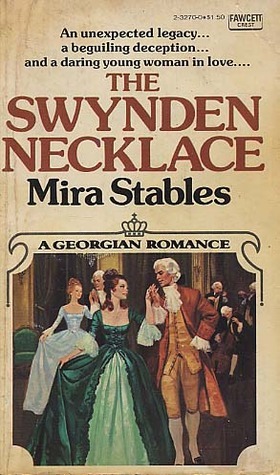 This book ran on swimmingly until about the 98% mark and then the hero committed such an offence, I’m not sure I can forgive him. There will be spoilers ahead, so don’t read on if you don’t want to know.
This book ran on swimmingly until about the 98% mark and then the hero committed such an offence, I’m not sure I can forgive him. There will be spoilers ahead, so don’t read on if you don’t want to know.
Here’s the premise: Miss Honoria Fenton has reached the grand old age of twenty-four without attracting a single offer of marriage. That’s what happens to the daughters of devout clergymen buried in the country. Papa has now been dead for more than a year, but it seems Mama intends to mourn his saintly person for the rest of her life, and Honoria is now buried in a different part of the country, with spinster Aunt Thomasine, along with twelve-year-old twins Percy and Tamsin. All Mama’s efforts are bent on getting Percy educated so that he can enter the church, with no thought for her daughters. Or for Percy, whose thoughts run in an entirely different direction (think Felix in Heyer’s Frederica).
But one day, Honoria receives a curious bequest from her godmother, the widow of the late Marquess of Melborne – a house in Bath, five hundred pounds to set herself up for a season there and the fabulous Swynden diamond necklace. Mrs Fenton disapproves of the frivolity of a season in Bath; Honoria’s clear duty is to sell the necklace for as much as she can get, in order to fund her brother’s career. The present Marquess of Melborne has offered a staggering thirty thousand pounds to reclaim it for the family. Honoria (and Aunt Thomasine) convince her that the offer will still be there if Honoria returns from Bath unwed, and off to Bath they go.
And almost at once, Honoria has an outbreak of stupidity, and decides to go for a solitary walk to the river, and inadvertently wanders into a seedy area. By happy coincidence (yes, that staple of Regency romances), a gentleman happens to be passing by and rescues her from a fate worse than death before escorting her home. He clearly recognises the address and her name. His name, he tells her, is Jocelyn, so naturally she calls him Mr Jocelyn.
Right away, the reader knows that Something Is Up, and that the mysterious Mr Jocelyn is a Very Important Person. He takes a strangely strong interest in Honoria, arranging for reputable chair men (the men who convey Bath residents here and there in sedan chairs), and even teaching her the minuet and dancing it with her at her first ball. Then, having launched her into society, he disappears.
Of course, since he’s the hero, it isn’t long before he returns (magically just in time to rescue her from another outbreak of stupidity) and it gradually becomes clear to the reader exactly who he is. Honoria doesn’t guess, and he doesn’t enlighten her, and this part of the story is actually very funny, because it becomes obvious that he never, ever lies about it. When she asks him direct questions, his answers are the absolute truth (as the reader is now aware) but are misleading enough that she never suspects his secret, that he is (and here’s the spoiler) the Marquess of Melborne, and not merely some kind of employee or associate of acquaintance (Honoria runs through various possibilities).
It’s all quite clever, and of course the reader is waiting for the dramatic moment when he reveals his identity to her. Except that he doesn’t, and here is where I take serious issue with him – he waits until *after* they get married to tell her, even though she’s told him quite clearly that she would hate to marry a marquess and be someone grand in society and have all that responsibility. His given reason for not telling her is that he was terrified that she would turn him down if she knew – which is precisely – precisely – why he should have told her. Instead, he chose to begin their married life with a huge lie, and yes, technically he never actually lied to her, but he allowed her to believe something he knew to be untrue. It was cruel and, frankly, unforgivable.
However, given the age of book and the different mores prevailing then and the way heroes tended to be domineering, and also given that for most of the book I totally enjoyed it, I’m only going to knock off one star. Four stars.
Review: A Confirmed Rake by Martha Keyes (2022)
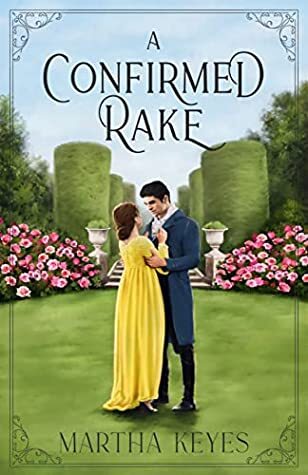 I’m loving this new series of Martha Keyes’. I recommend starting with the free (at the time of writing) prequel, Unrequited, and paying attention to the whole family – they really are an interesting lot. This one focuses on the sister and brother of the previous hero and heroine, one an unreformed rake and the other a girl who’s been buried in the country for years finally making a belated appearance in society. It’s a fascinating pairing.
I’m loving this new series of Martha Keyes’. I recommend starting with the free (at the time of writing) prequel, Unrequited, and paying attention to the whole family – they really are an interesting lot. This one focuses on the sister and brother of the previous hero and heroine, one an unreformed rake and the other a girl who’s been buried in the country for years finally making a belated appearance in society. It’s a fascinating pairing.Here’s the premise: Valentine Donovan is that staple of Regency romances, an out-and-out rake, a gambler, womaniser and thoroughly unreliable sort. He’s butted heads with his Admiral father for years, dropping out of the naval career that was planned for him, and getting himself into all sorts of trouble ever since. Finding himself on his father’s wrong side once more, he escapes to the Brighton home of his newly married sister, Diana. Creeping into the house through the kitchen window after a drunken night out, he encounters a girl enjoying a midnight feast, a girl like no one else he’s ever met before.
Rebecca Russell’s brother has finally married, and at last she’s able to leave the seclusion of her reclusive grandfather’s home, where she mingled only with other elderly gentlemen, and make an appearance in Brighton society. She’s never had a chance to develop the finely-tuned social skills she’ll need in high society, and she has no idea how to behave. Her innocence gets her into all sorts of trouble, but she finds Valentine unexpectedly helpful. He knows he’s bad for her, though, so he does his best to avoid her. But when his father gives him an ultimatum – at least try to behave with restraint and start courting a respectable young woman — Diana coaxes him to squire Rebecca around. It will be good for her, she argues, to learn about society while protected by a gentleman, and it will be good for him to demonstrate his good intentions to his father.
Well, we can see where this is going, can’t we? And two more mismatched people would be hard to find. But if Valentine is a conventional Regency character, Rebecca is anything but. She has no idea about anything, and approaches everything with an infectious joie-de-vivre that’s an absolute delight. Her conversations with Valentine, where she asks in all innocence some very probing questions, are glorious. She learns a lot, and charmingly mangles all the terminology (she talks about ‘foxing’ and ‘raking’, instead of getting foxed or being a rake), making detailed and often wildly inappropriate lists of all sorts of things. And in explaining society ways in uncompromising detail, Valentine is forced to face up to his own misbehaviour. In gently steering Rebecca through the obstacle course of society life, he learns to take responsibility for himself, as well. And needless to say, the two are slowly falling in love.
But the course of true love can’t possibly be smooth (this is a Regency romance, after all), so both Valentine’s father and Rebecca’s brother have to be appeased, and Valentine’s precarious financial situation has to become a lot worse before all is resolved. I don’t recall any Americanisms or anything else to trip me up, although the monetary amounts stated seemed a bit on the low side to me. At one point, eight hundred pounds was quoted as allowing the purchase of a small estate, which seems a bit unlikely. A small house, maybe. But that’s not a big deal.
The only real problem I had was that the story was told from two points of view, but both were written in first person (‘I went…’ rather than ‘Valentine went…’). Even though the chapters were labelled with the character name, I still sometimes got confused with the switches, and ended up at one point wondering why Valentine was wearing a gauzy overdress. Silly me. That’s the author’s stylistic choice, of course, which I perfectly respect, and I understand why it was done, but it can be problematic. I suppose I should read more slowly!
Another lovely read in this series, which gave us some more wonderful characters, a deeper understanding of the family, and especially the Admiral, and a beautifully written evocation of the Regency. Five stars (again). And now on to book-loving brother Phineas…



